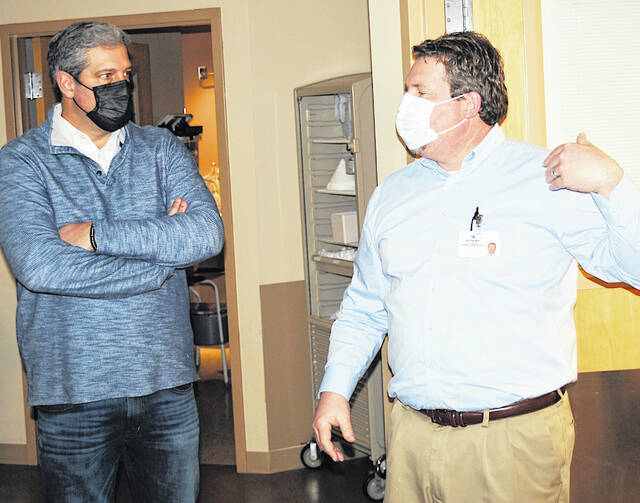
Ohio 13th District Congressman Tim Ryan visited Highland District Hospital last Thursday during a campaign stop in his bid for the open U.S. Senate seat in Ohio.
Before touring the facility, Ryan discussed the needs of the hospital with HDH President and CEO Randy Lennartz; Tim Parry, the hospital’s vice president of operations; and Meghann Ackley, the hospital’s vice president of finance and chief financial officer.
Lennartz explained how Ryan and the federal government can help the hospital. “Well, I think it’s understanding the rural environment a little bit,” he said. “We’re here 24-7, and we obviously have lower volumes than other facilities, but we have to be here for those what-if situations, and so we have to have that money to make sure we can have people just in case.”
He said the demand on the hospital can vary greatly. “Even in the emergency room, there may be a night when we only have three patients, but the next night there could be 30, and we have to pay whether we have three or 30; the cost is the same for that,” he said.
Ryan expressed his willingness to advocate for the hospital if elected to the U.S. Senate. “I think the first thing is to bring attention to the challenges they have here,” said Ryan. “It’s obviously different than some of the bigger hospitals, and I think a lot of times the smaller hospitals get forgotten, and they’ve got a lot of complex issues, of which funding is one, so for these federally qualified clinics that they have we can continue to push for those along with expansion of Medicare, and expansion of Medicaid from the reimbursement side.”
Lennartz expressed his appreciation for federal funding that has helped the hospital face the additional challenges associated with the COVID-19 pandemic. “With what they’ve done over the past year with the COVID funds … we’ve been able to buy the equipment for the employees so they were safe — with CARES Act money and stuff like that,” he said. “It has really helped.”
Lennartz said that while the pandemic-related funding alieved many potential problems, there are still future concerns. “My biggest worry is about what is going to happen after this is over,” he said. “We have a lot of worry into the future that they’ll make budgetary decisions without understanding how that impacts each of us, whether it be on our taxes, the health care services we can offer, and how we are going to balance this.”
Ryan emphasized the importance of keeping the hospital open. “The reality of it is, if this hospital closes, the costs for health care are going to go up for everybody, and you’re going to have less healthy people, so there’s a real benefit in focusing on the rural hospitals and making sure they have the resources that they need,” he said. “So, being in the Senate – one of 100 – as you’re debating these bills to have somebody fighting for these hospitals and the people here to get their health care is going to be really, really important.”
Although the pandemic has put a strain on the hospital’s staff, they have been able to meet the needs so far. “We’re at full capacity, but it goes back and forth,” said Lennartz. “Sometimes the COVID piece of it is less than half, and sometimes it is more than half. Today we’re full, but only a third of it is COVID, so there are many other things that are going around right now that we’re taking care of.”
Lennartz said earlier in the week half of the demand was related to COVID, but the amount of COVID-related hospitalizations has not surpassed that during the pandemic.
Ryan said the way government and society handles the pandemic is continually evolving. “This is the first pandemic that we have had to deal with in modern history where it’s taken over the whole society, so I think we’ve learned a lot, and I don’t support the mandate because I think that’s just going to complicate things for trying to deal with personnel with hospitals or other businesses.”
Although Ryan does not support vaccine requirements, he encourages vaccinations. He said most of the hospitals he has visited are primarily filled with people who are unvaccinated.
Ryan said getting vaccinated is one way to help health care professionals. “Everyone has got to be responsible for themselves, but also considerate of the health care workers here who are really burnt out and have been working hard for now two years,” he said.
Ryan added that he believes the pandemic should not be turned into a politically divisive issue. “If we look at it that way and not try to score any political points, I think we’re smart enough to be able to figure it out and hopefully be prepared should this happen again as we continue to get these waves or some other pandemic. Hopefully, we’ll be more schooled and versed in how to handle it,” he said.
According to Lennartz, the hospital is currently on good footing financially, but he is working to ensure that remains to be the case in the future. “In December, we paid off all of our bonds so we have no debt,” he said. “We’ve got a great medical staff, and we’ve got a great regular staff, but we have an aging population, and we’re going to need more doctors, and we’re going to need more staff as you look to the future, and it’s just finding those people.”
Reach John Hackley at 937-402-2571.


